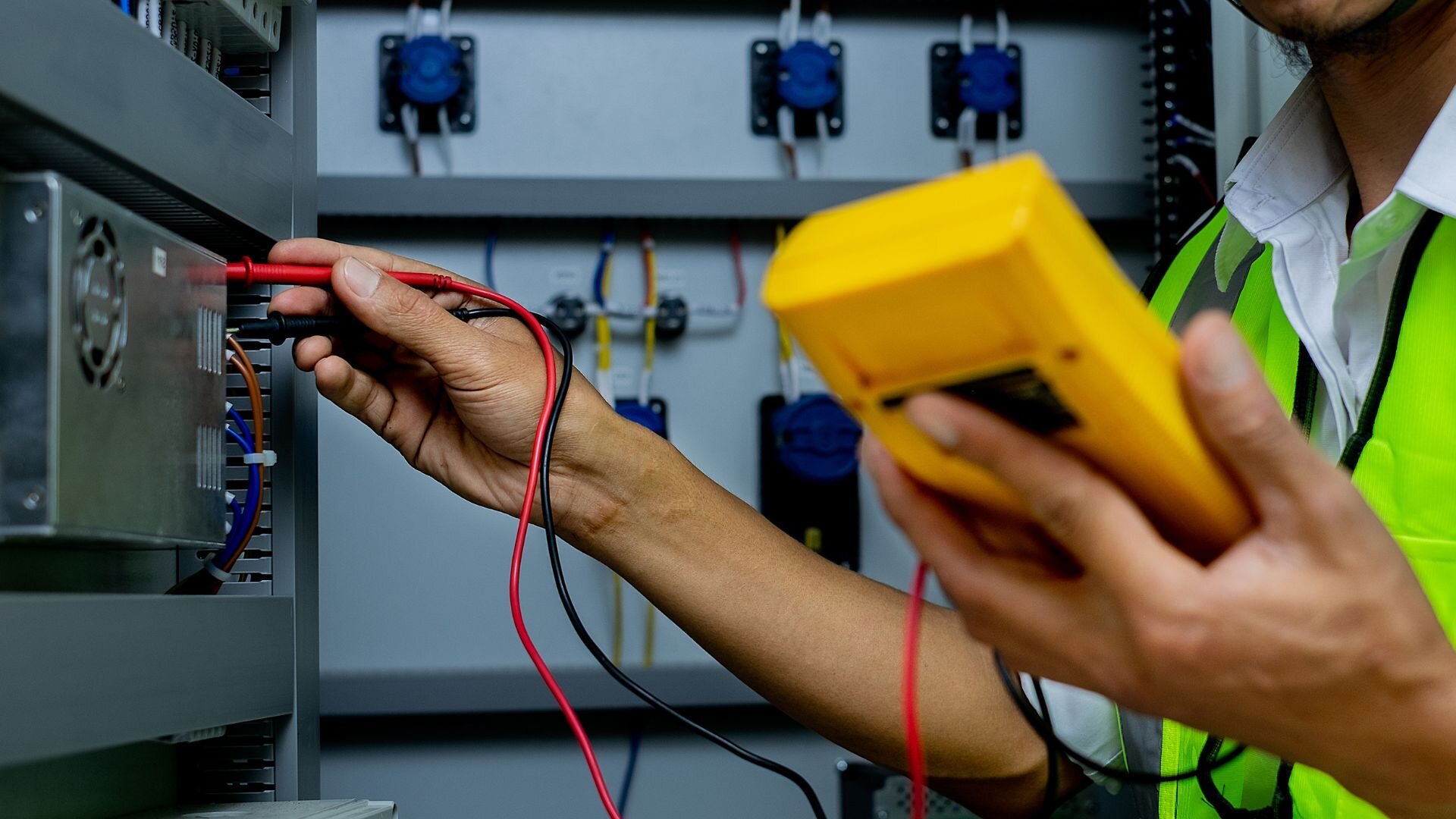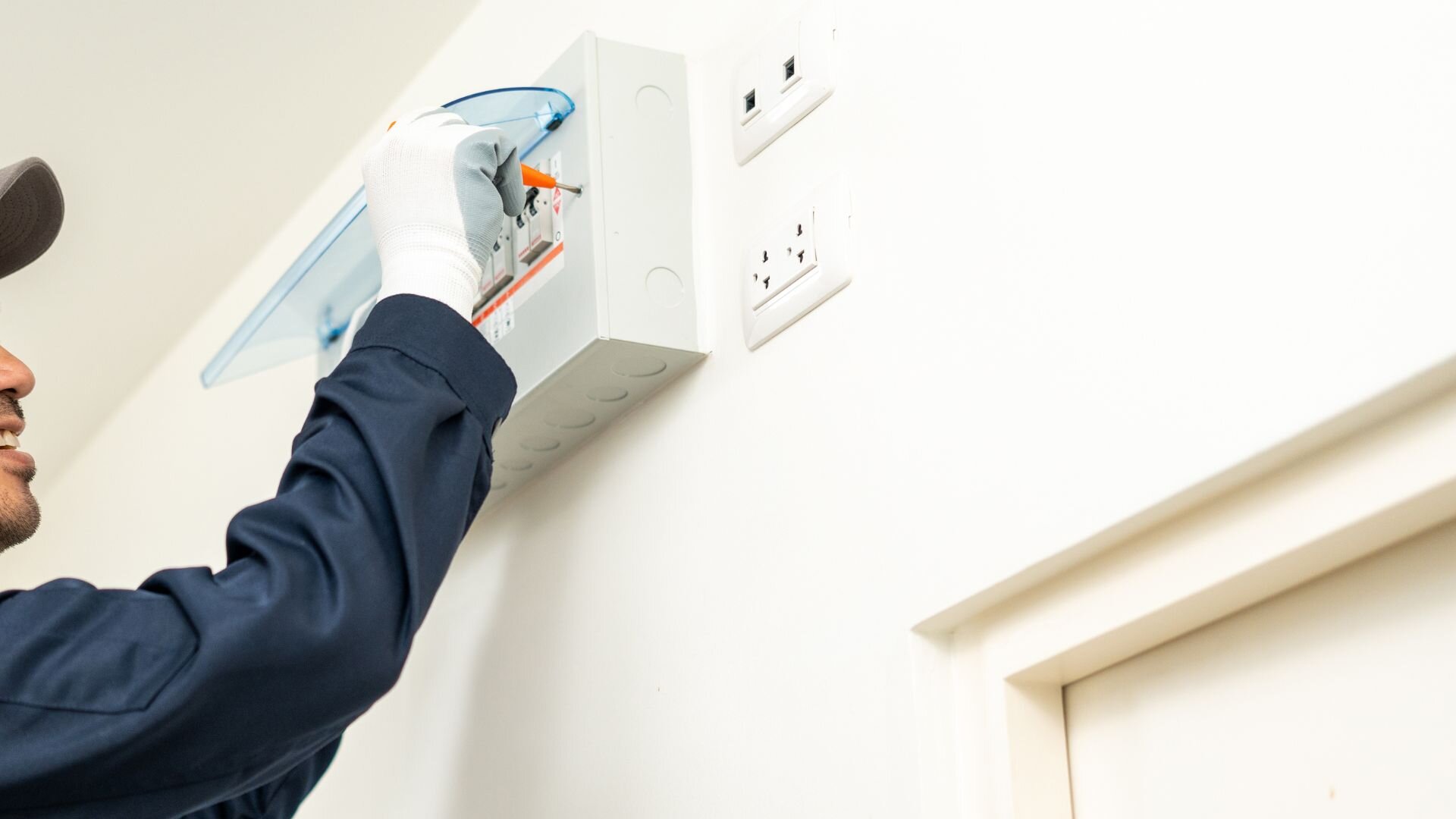Home electrical systems are responsible for over 40% of household fires in Australia, yet many homeowners are unaware of the hidden dangers lurking behind their walls. When was the last time your home underwent a thorough electrical inspection? Regular electrical system assessments could make all the difference in preventing potential hazards. Regular electrical inspections are often overlooked but crucial in safeguarding your family and property.
Electrical inspections are about spotting hidden problems, ensuring everything’s safe, and stopping minor issues from becoming big headaches. If you skip regular checks, you might leave your home open to preventable risks. These inspections aren’t just about ticking boxes; they’re about peace of mind and protecting your loved ones.
We’ll explore the key benefits of routine electrical inspections, why they’re essential for every household, and how they contribute to a safe and secure living environment. Maintaining electrical safety in your home starts with proactive measures, and regular electrical inspections are crucial to that responsibility.
What a Periodic Electrical Inspection Involves
A periodic electrical inspection is a comprehensive process ensuring your home’s electrical system functions safely and efficiently. These regular electrical assessments are vital to maintaining electrical safety across your electrical systems.

What a Safety Inspection Covers
A periodic safety inspection thoroughly checks your electrical system, including wiring, switches, outlets, and electrical panels. Electricians look for wear, damage, or any components that may pose a safety risk.
Assessing Critical Components
When licensed electricians inspect your home’s electrical system, they inspect everything from the wiring to how well the outlets are working and make sure the electrical panels are functioning properly. Keeping these parts in good nick can help reduce risks.
Checking Compliance and Quality
Electricians ensure your home’s electrical system meets current safety standards. Electrical safety inspections are designed to identify damage and verify the quality of installations, giving you peace of mind.
Procedures Followed
Electricians use various inspection methods, such as thermal imaging, load tests, and visual assessments. These procedures are crucial to identifying issues that might go unnoticed and keeping your home safe through regular electrical maintenance.
Importance of Home Safety and Electrical Compliance
Maintaining home safety is critical to protecting your property and loved ones. Electrical safety inspection is essential in preventing potential hazards in your home.
- Preventing Hazards from Faulty Systems: Faulty wiring, overloaded circuits, and outdated home electrical systems are common causes of electrical incidents. These potential hazards can pose severe risks, from fires to electric shocks. The benefits of regular electrical inspections include helping identify and mitigate these dangers.
- Ensuring Compliance with Standards: Compliance with Australian safety standards is crucial. Regular inspections ensure your home’s electrical installations are up-to-date, safe, and fully compliant. The benefits of regular electrical inspections include maintaining your property in line with current safety guidelines.
- Long-term Safety Benefits: Home’s electrical systems need periodic assessments to maintain safety. Regular electrical inspections safeguard your property, ensuring electrical installations operate safely and effectively.
Identifying and Preventing Electrical Hazards
Regular inspections are essential to identify potential hazards hidden within your electrical systems. During an electrical inspection, professionals use an electrical inspection checklist to thoroughly examine all aspects, from electrical wiring to connections. These periodic electrical safety inspections help ensure your home’s electrical systems are secure and up to safety standards.
Identifying Hidden Dangers: Regular inspections can help uncover hidden dangers, such as frayed wiring, deteriorated insulation, and loose connections. Identifying these issues early is crucial in preventing them from becoming significant problems. A thorough electrical safety check helps pinpoint electrical maintenance areas, reducing risks.
Risks of Undetected Faults: Undetected faults in your electrical systems can lead to severe consequences, including fires and electric shocks. Ensuring regular inspections helps maintain safety standards and minimise these risks. Safety inspections provide a proactive way to identify dangerous conditions that could compromise safety.
Common Household Electrical Hazards:
- Overloaded power points
- Unsafe electrical installations
- Damaged or exposed wiring
- Poor-quality or deteriorated insulation
- Loose electrical connections
These common hazards can pose serious threats, but regular inspections can help prevent them. An electrical inspection checklist is crucial to identify any faults, and inspections can be a practical part of your overall electrical maintenance plan. Regular assessments ensure your electrical systems function safely and effectively, safeguarding your home and loved ones.
Protecting Your Home from Electrical Fires
Faulty wiring is one of the leading causes of electrical fires, with numerous house fires occurring yearly due to electrical hazards. Poor electrical installation or outdated wiring can cause overheating, which may eventually lead to fires. To keep your home safe, regular inspections can help identify these potential fire risks before they escalate into serious problems.
An electrical installation condition report is critical to ensuring your home’s electrical safety. This report outlines the condition of your electrical installation, providing a clear assessment of potential risks. Electrical safety checks, including an inspection checklist, allow professional electricians to pinpoint issues such as overheating circuits, improper wiring, or malfunctioning electrical equipment that can cause sparks. These safety checks are crucial to make sure your home remains protected.
A professional electrical inspection can give you peace of mind, knowing that your home and electronics are safeguarded against fire hazards. Regular inspections can include evaluating electrical equipment and wiring to ensure everything is up to standard. Electricians also conduct necessary repairs and updates to protect your home from fire risk. Scheduling an electrical inspection is an effective way to keep your home secure and maintain the safety of all installations.
Enhancing Family Safety
Regular check-ups are crucial for keeping your home safe and reducing the chances of electric shocks and injuries. An electrical inspection pinpoints dangers that might threaten family, especially kids and pets. Inspections focus on common risks like unprotected outlets and dodgy wiring, ensuring everything meets safety standards.
A periodic electrical inspection evaluates all electrical systems to enhance home electrical safety. Inspections provide the benefits of electrical inspection, contributing to your home’s safety by identifying potential dangers. Homeowners become aware of safe practices and learn to use electrical appliances properly, which can further prevent accidents.
How often is a periodic inspection required? The electrics of an owner-occupied home should be inspected and tested every ten years, and every five years for a rented house.
Regular inspections and adherence to electrical safety standards help ensure your home remains a safe environment for everyone. These checks address the immediate condition of your electrical installations and help instil long-term habits for maintaining home electrical safety.
Reducing Unexpected Electrical Failures
Routine inspections are crucial in ensuring the reliability of home electrical systems. Periodic inspections help maintain safety compliance and the proper functioning of essential electrical components. Scheduling an electrical inspection of your home helps identify potential hazards, such as faults in the electrical panel or ground fault circuit interrupter (GFCI), reducing the risk of unexpected breakdowns.
Taking preventive steps like testing and maintenance can prevent unexpected power cuts or malfunctions in crucial systems like lighting, heating, and cooling. Ensuring your home is in top shape involves spotting potential issues early on. With this proactive approach, your electrical systems are set to operate smoothly, even when demand peaks.
Unexpected electrical failures can be highly inconvenient, particularly during critical moments. Routine inspections reduce the likelihood of such interruptions. Whether you need an electrical inspection when buying or selling a home, ensuring safety is essential to avoiding surprises and maintaining comfort in your living space.
Supporting Insurance Compliance
Regular electrical inspections are essential for supporting home insurance requirements. Insurance providers often require proof of electrical inspections to validate fire or electrical damage claims. Keeping up with periodic inspections provides a clear record of compliance and maintenance, which is valuable if a claim needs to be made.
An electrical inspection ensures that all electrical systems meet safety standards, demonstrating proactive care in reducing risks. This contributes to the safety of your property and helps ensure that insurance claims are supported with evidence of responsible maintenance, reducing complications during the claims process.
When Should Homeowners Get an Electrical Inspection?
It is essential to know when inspections are necessary to maintain safety functionality and maximise the safety benefits of regular electrical inspections. There are several critical times when homeowners should schedule an inspection:

Guidelines for Regular Inspections
Homeowners should conduct an electrical inspection every ten years for owner-occupied properties and every five years for rented homes. Regular inspections help ensure compliance with electrical safety regulations and maintain optimal safety functionality.
Occasions Requiring Electrical Inspection
An inspection is essential when purchasing a new home, after completing electrical work or renovations, or when there are visible signs of issues, such as faulty, flickering lights or power outlets. These occasions need an electrical inspection to help identify any underlying problems that may pose safety risks.
Older Homes and Post-Major Electrical Work
Older homes and those that have undergone significant electrical work need periodic inspections to verify safety, and inspection delays can increase the risk of hazards. Inspections can help ensure your home is compliant and prevent minor issues from escalating, saving money in the long run.
Regular inspections ensure that your home is more than just functional—it is safe. Inspections provide a proactive approach to home safety, adhering to electrical safety regulations and reducing risks. Conducting inspections helps identify potential hazards before they lead to more severe problems, ensuring your home remains secure and protected.
Hiring the Right Electrician for Your Inspection
Selecting a qualified electrician ensures a thorough and reliable home electrical safety check. A home electrical safety check should assess all electrical installations according to Australian standards, specificallyAS/NZS 3019. This standard sets the requirements for periodic assessments of electrical installations connected to a low-voltage a.c. Supply system every two years, ensuring that equipment and installations are safe for continued use.
- Tips for Selecting an Electrician: When hiring an electrician for your inspection, choosing a licensed and experienced professional is essential. To conduct these checks, electricians must be licensed with theQBCC (Queensland Building and Construction Commission) as Registered Electrical Contractors (RECs). Asking for referrals and reading reviews can help identify reliable candidates. Ensure the electrician is familiar with local codes, including AS/NZS 3019, and meets all electrical safety inspection and testing requirements.
- Importance of Licensing and Expertise: A qualified electrician should demonstrate adherence to Australian standards and the electrical code. During an inspection, electricians examine fittings, appliances, wiring, installation methods, and critical points like electrical panels. Proper grounding, bonding practices, and correctly terminated circuits are vital aspects of their work, all contributing to maintaining safety and compliance in your home.
Safeguard Your Home with Professional Inspections
Periodic electrical inspections are a proactive way to ensure the safety of your home and loved ones. Regular checks provide peace of mind by addressing potential risks before they escalate into bigger issues. They help prevent electrical fires, extend the life of your systems, and ensure compliance with Australian standards.
For homeowners on the Gold Coast, Enersol Electricaloffersreliable and professional periodic maintenance services. Contact us today to protect your home, family, and peace of mind. Call us or schedule an appointment to learn more about how our services can help maintain the safety and efficiency of your home’s electrical system.